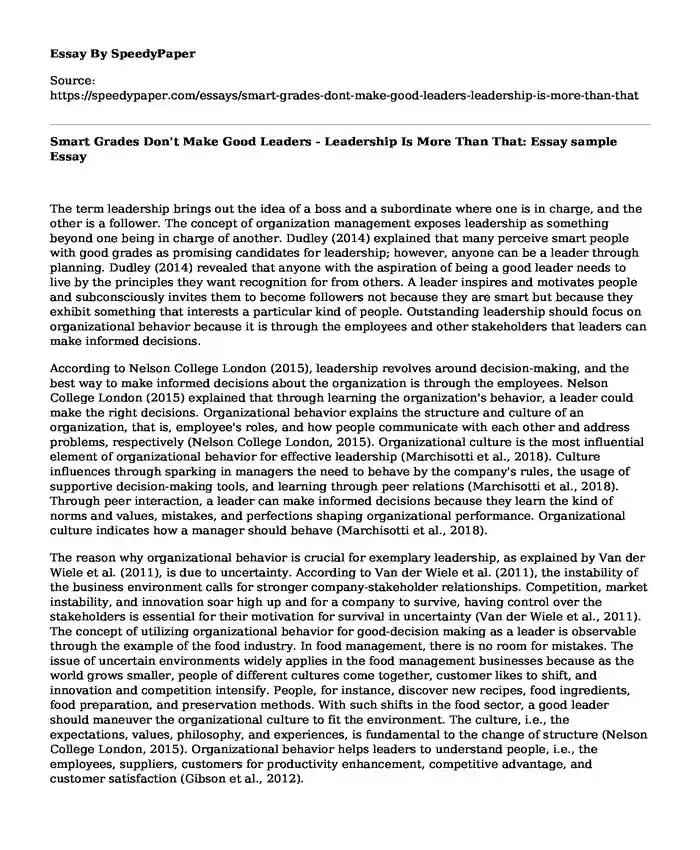
| Type of paper: | Essay |
| Categories: | Leadership analysis |
| Pages: | 3 |
| Wordcount: | 707 words |
The term leadership brings out the idea of a boss and a subordinate where one is in charge, and the other is a follower. The concept of organization management exposes leadership as something beyond one being in charge of another. Dudley (2014) explained that many perceive smart people with good grades as promising candidates for leadership; however, anyone can be a leader through planning. Dudley (2014) revealed that anyone with the aspiration of being a good leader needs to live by the principles they want recognition for from others. A leader inspires and motivates people and subconsciously invites them to become followers not because they are smart but because they exhibit something that interests a particular kind of people. Outstanding leadership should focus on organizational behavior because it is through the employees and other stakeholders that leaders can make informed decisions.
According to Nelson College London (2015), leadership revolves around decision-making, and the best way to make informed decisions about the organization is through the employees. Nelson College London (2015) explained that through learning the organization's behavior, a leader could make the right decisions. Organizational behavior explains the structure and culture of an organization, that is, employee's roles, and how people communicate with each other and address problems, respectively (Nelson College London, 2015). Organizational culture is the most influential element of organizational behavior for effective leadership (Marchisotti et al., 2018). Culture influences through sparking in managers the need to behave by the company's rules, the usage of supportive decision-making tools, and learning through peer relations (Marchisotti et al., 2018). Through peer interaction, a leader can make informed decisions because they learn the kind of norms and values, mistakes, and perfections shaping organizational performance. Organizational culture indicates how a manager should behave (Marchisotti et al., 2018).
The reason why organizational behavior is crucial for exemplary leadership, as explained by Van der Wiele et al. (2011), is due to uncertainty. According to Van der Wiele et al. (2011), the instability of the business environment calls for stronger company-stakeholder relationships. Competition, market instability, and innovation soar high up and for a company to survive, having control over the stakeholders is essential for their motivation for survival in uncertainty (Van der Wiele et al., 2011). The concept of utilizing organizational behavior for good-decision making as a leader is observable through the example of the food industry. In food management, there is no room for mistakes. The issue of uncertain environments widely applies in the food management businesses because as the world grows smaller, people of different cultures come together, customer likes to shift, and innovation and competition intensify. People, for instance, discover new recipes, food ingredients, food preparation, and preservation methods. With such shifts in the food sector, a good leader should maneuver the organizational culture to fit the environment. The culture, i.e., the expectations, values, philosophy, and experiences, is fundamental to the change of structure (Nelson College London, 2015). Organizational behavior helps leaders to understand people, i.e., the employees, suppliers, customers for productivity enhancement, competitive advantage, and customer satisfaction (Gibson et al., 2012).
In summary, anyone can be a leader through proper planning, and through the management of organizational behavior, i.e., culture and structure, one can be a good leader. Organizational behavior management is mostly excellent in uncertain environments. Effective leadership is achievable through organizational behavior because leaders can understand interactions and needs for critical stakeholders, hence can make informed decisions.
References
Gibson, L.J., Ivancevich, M.J., Donnelly, H.J Jr., & Konopaske, R.(2012). Organizations: Behavior, structures, processes (14th ed.). McGraw-Hill.http://dl.motamem.org/organizations_behavior_structure.pdf
Marchisotti, G. G., Almeida, R. L., & Domingos, M. L. C. (2018). Decision-making at the first management level: The interference of the organizational culture. Revista de Administração Mackenzie, 19(3). http://dx.doi.org/10.1590/1678-6971/eramr180106
Nelson College London. (2015, Mar 25). Organizational behavior: Structures & Cultures [Video]. YouTube. https://www.youtube.com/watch?v=JIa7vP3gyL4Tedx Talks. (2014, Oct. 9). TEDxAnchorage - Drew Dudley - The leadership game: creating cultures of leadership [Video].
YouTube https://www.youtube.com/watch?v=EuB9S6fzMigVan der Wiele, T., van Iwaarden, J., Williams, R., & Eldridge, S. (2011). A new foundation for quality management in the business environment of the twenty-first century. Total Quality Management & Business Excellence, 22(5), 587-598. doi: 10.1080/14783363.2011.568264
Cite this page
Smart Grades Don't Make Good Leaders - Leadership Is More Than That: Essay sample. (2023, Nov 30). Retrieved from https://speedypaper.com/essays/smart-grades-dont-make-good-leaders-leadership-is-more-than-that
Request Removal
If you are the original author of this essay and no longer wish to have it published on the SpeedyPaper website, please click below to request its removal:
- Shared Governance in Nursing, Essay Sample for Everyone
- Free Essay on Effective Approaches to Leadership and Management in Nursing
- Free Essay Example. When the Coach Is You: Reflection
- Free Essay Example. Entrepreneur's Leadership Role
- Free Essay Sample on Professional Leadership
- Research Paper on Deconstruction of Leadership
- Essay Example: Health Systems Thinking
Popular categories




